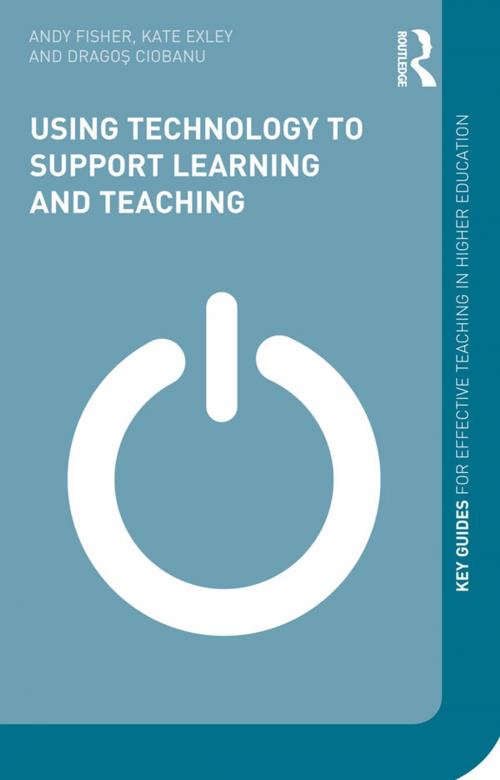Using Technology to Support Learning and Teaching
Nonfiction, Reference & Language, Education & Teaching, Teaching, Computers & Technology, Teaching Methods| Author: | Andy Fisher, Kate Exley, Dragos Ciobanu | ISBN: | 9781135108441 |
| Publisher: | Taylor and Francis | Publication: | January 3, 2014 |
| Imprint: | Routledge | Language: | English |
| Author: | Andy Fisher, Kate Exley, Dragos Ciobanu |
| ISBN: | 9781135108441 |
| Publisher: | Taylor and Francis |
| Publication: | January 3, 2014 |
| Imprint: | Routledge |
| Language: | English |
The climate of Higher Education is changing rapidly. The students are more likely to see themselves as consumers and have increasingly high expectations regarding teaching and learning. Universities are in part aiming to meet this need by increasing the use of technology; for example, whether to increase access to teaching materials outside the classroom or to make lectures more interactive. Although there is no illusion amongst Higher Education intuitions that technology is a panacea, it is clear that technology is a vital tool in meeting expectations and one that will be used more and more. Consequently the context of this book is one in which technology needs to be understood as part of an overall teaching practice.
Technology continues to move on a pace and is used increasingly within Higher Education to support and enhance teaching and learning. There are books which are steeped in technical detail and books which are steeped in theoretical pedagogy with little discussion about the impact on learning and student/teacher behaviour. Using Technology to Support Learning and Teaching fills a gap in the market by providing a jargon free (but pedagogically informed) set of guidance for teaching practitioners who wish to consider a variety of ways in which technology can enrich their practice and the learning of their students. It integrates a wide range of example cases from different kinds of HE institutions and different academic disciplines, illustrating practicable pedagogies to a wide range of readers. It is full of advice, hints and tips for practitioners wanting to use technology to support a style of teaching and learning that is also built on sound pedagogical principles. It will provide a quick user-friendly reference for practitioners wanting to incorporate technology into Higher Education in a way that adheres to their learning principles and values .
This book is primarily for teaching practitioners, particularly those who are new to the industry.This book would also prove useful on training courses for practitioners; such as the Postgraduate Certificate for Higher Education. The authors also intend that the book be of value to newer teachers (perhaps taking teacher training programmes) who wish to see where recommended approaches link to pedagogy.
The climate of Higher Education is changing rapidly. The students are more likely to see themselves as consumers and have increasingly high expectations regarding teaching and learning. Universities are in part aiming to meet this need by increasing the use of technology; for example, whether to increase access to teaching materials outside the classroom or to make lectures more interactive. Although there is no illusion amongst Higher Education intuitions that technology is a panacea, it is clear that technology is a vital tool in meeting expectations and one that will be used more and more. Consequently the context of this book is one in which technology needs to be understood as part of an overall teaching practice.
Technology continues to move on a pace and is used increasingly within Higher Education to support and enhance teaching and learning. There are books which are steeped in technical detail and books which are steeped in theoretical pedagogy with little discussion about the impact on learning and student/teacher behaviour. Using Technology to Support Learning and Teaching fills a gap in the market by providing a jargon free (but pedagogically informed) set of guidance for teaching practitioners who wish to consider a variety of ways in which technology can enrich their practice and the learning of their students. It integrates a wide range of example cases from different kinds of HE institutions and different academic disciplines, illustrating practicable pedagogies to a wide range of readers. It is full of advice, hints and tips for practitioners wanting to use technology to support a style of teaching and learning that is also built on sound pedagogical principles. It will provide a quick user-friendly reference for practitioners wanting to incorporate technology into Higher Education in a way that adheres to their learning principles and values .
This book is primarily for teaching practitioners, particularly those who are new to the industry.This book would also prove useful on training courses for practitioners; such as the Postgraduate Certificate for Higher Education. The authors also intend that the book be of value to newer teachers (perhaps taking teacher training programmes) who wish to see where recommended approaches link to pedagogy.















